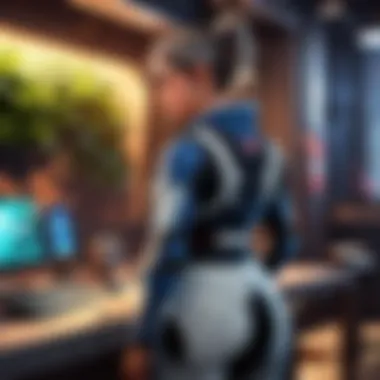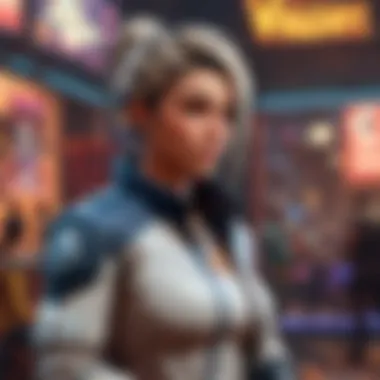Conquering Feelings of Uselessness in Gaming


Game Overview
Prolusion to Valorant
Valorant is a tactical first-person shooter developed by Riot Games. Released in June 2020, this game merges traditional shooter elements with unique character abilities. Each match consists of two teams of five players. The primary objective is to perform tasks, either planting or defusing a bomb-like device called the Spike. Success often relies on teamwork, strategy, and individual skill. Multiplayer games often intensify emotions, especially feelings of inadequacy or uselessness.
Game Mechanics and Objectives
The gameplay of Valorant centers around one primary mode: attacking and defending. Each round provides teams an opportunity to switch roles, adding complexity to the strategical elements. Players must communicate effectively. Utilizing agent abilities, knowing map layouts, and choosing weapons all contribute to success.
Understanding player positioning is essential. Notations about areas help navigate the map, and knowing when to engage in combat can turn the tide of the game.
Brief History of the Game
Valorant originated as Project A at Riot Games. Its development stemmed from a desire to merge action-oriented gameplay with strategic depth. The game quickly gained popularity upon release, and a burgeoning esports scene followed. Competitive matches in various tournaments, like the VCT, demonstrated intense levels of player skill and teamwork.
Subsection: Playable Agents and Their Unique Abilities
Valorant boasts a diverse roster of characters called agents, each with distinct abilities. The agents fall into various categories such as Duelists, Sentinels, Initiators, and Controllers. This diversity allows for multiple playstyles. For instance:
- Jett is an agile duelist
- Sage is a supportive healer
- Sova specializes in reconnaissance
Understanding agents’ abilities deeply influences both individual and team success. Mastery in selecting an agent aligned with playstyle is crucial.
In competitive gaming, emotions significantly impact gameplay. Recognizing and addressing feelings of uselessness could lead to improved performance. Understanding one’s emotional landscape can open pathways to greater resilience and success.
Strategy Guides
Tips for Beginners
Starting as a new player can be overwhelming due to the high skill level prevalent among the experienced community. Here are a few effective tips:
- Focus on Communication: Building good relationships with teammates fosters cooperation and gameplay reliability.
- Learn the Mechanics: Spend time practicing enemy spotting and recoil control.
- Play the Tutorials: Utilize in-game resources to familiarize yourself with objectives.
Advanced Tactics for Experienced Players
For the more seasoned players, pushing personal boundaries is key. Keeping ahead of opponents requires adaptability and acknowledgment of emotions linked to performance suicides. Advanced tactics include:
- Map Control: Study control point dynamics to secure advantageous positions.
- Economy Management: Wisely understanding weapon purchasing impacts potential future rounds.
Map-Specific Strategies
Each Valorant map presents unique opportunities for maneuvering and positioning:
- Bind: Use teleporters wisely to confuse opponents.
- Haven: Take advantage of the three bomb sites for stronger strategic planning.
Subsection: Agent-Specific Tactics and Playstyles
Focusing on particular agents enhances effectiveness during games:
- Emphasize cover and pinpoint healing if utilizing Sage.
- Skills showcased by Cypher can turn into psychological warfare for enemies.
Patch Updates
Summary of Recent Game Patches
Riot Games continually improves Valorant through regular patch updates. Staying aware of recent changes can give players leverage. Recent patches often include bug fixes and balances to agents’ abilities and overall gameplay mechanics.
Analysis of Changes to Agents, Weapons, and Maps
Patch adjustments shape the gaming climate. Therefore, analyzing agent adjustments can inform your strategies, outcomes, and future updates.
Community Feedback on Patch Notes


Community forums, e.g., Reddit, often explore patch notes in detail. Collective user input can reveal beneficial tactics shared amongst players.
Subsection: Predictions for Upcoming Updates
Remaining aware of conversations regarding future changes can enhance time in the game. Paying attention to developer blogs might lead to insights on updates in specific agents or map revamps.
Esports Coverage
Overview of Recent Valorant Esports Events
The Valorant competitive scene has exploded since launch. Major tournaments, particularly the Valorant Champions Tour, accumulate thousands of teams worldwide. This vitality solidifies a strong esports community.
Tournament Predictions and Analysis
Gathering data from previous tournament outcomes helps forecast which teams may excel in upcoming events. When analyzing team dynamics, consider composition and playstyle.
Subsection: Insights on Current Professional Meta
Each meta evolves based on player trends and reactions. Keeping abreast of which agents dominate play can create advantageous opportunities.
Player Community
Featured Player Highlights
Notable gamers consistently innovate methods of gameplay. Their techniques contribute positively, allowing for a better grasp of emotions connected with feeling useless.
Community-Created Content Showcase
Platforms like Facebook are emerging avenues for community contributions. Players share guides, playthroughs, and discussion points. Such content might ease a player's emotional strain and increase awareness.
Forum Spotlight on Trending Topics
Chat forums regularly display discussions on potent patterns impacting emotions within gameplay contexts. Recognizing peers’ sentiments paves the way for emotional understanding-oriented strategies.
Through this exploration of multifaceted topics, it becomes clear that feelings within competitive gaming environments, particularly pertaining to Valorant, warrant serious recognition and attuned responses.
Understanding Uselessness
Understanding feelings of uselessness is vital in today's fast-paced and competitive environments, like gaming. These feelings are not only detrimental to an individual’s self-esteem but also impact emotional well-being and performance in various activities. When gamers experience a sense of inadequacy, it can lead to a cycle of poor performance and negative self-assessment. Recognizing the root causes of these emotions helps in developing strategies to combat them.
The Concept of Uselessness
The term "uselessness" embodies a deep sense of inadequacy. It indicates a perception that one does not contribute enough or meet certain expected standards. This concept has broad implications in both personal and communal contexts, particularly within competitive scenes of gaming. When players feel useless, they often struggle to engage in their favorite activities. This creates a feedback loop where avoiding these activities only deepens feelings of worthlessness.
Feelings of uselessness stem from various influences, including personal performance, social comparison, or the narrative crafted in high-stakes environments like esports. Understanding this phenomenon-first grips its definition and associated personal experiences can provide the groundwork for addressing related emotions.
Causes of Feelings of Inadequacy
Many factors lead to feelings of inadequacy. Firstly, poor performance in a game or competition can trigger self-doubt. Gamers can frequently internalize mistakes or losses, translating them into a belief system based on personal failings. Moreover, unrealistic expectations contribute to this inadequacy. When players set goals unattainable under healthy conditions, frustration and disappointment quickly become prevalent. Such situations may arise from pressure to match peers, especially in a competitive group.
Effective coping mechanisms are necessary to navigate these turbulent emotional waters. Understanding the roots of one’s inadequacies is the first step.
Societal Influences on Self-Worth
Society plays a considerable role in shaping individual self-worth. External pressures arise from areas like social media and community comparisons. Platforms used for promoting gaming highlight heroic moments followed often by missed opportunities. This juxtaposition can lead players to question their value if they do not appreciate similar accomplishments.
Additionally, societal narratives around success and failure must be noted. These narratives often prioritize achievement and skill rank over personal growth and well-being. Such strong, fact-hardened benchmarks promote a culture where feelings of uselessness can flourish, making emotional battles seem normalized. It is essential to dissect these social influences to unearth their impacts on how gamers perceive themselves, clearing pathways toward self-acceptance and promoting an authentic self-worth rooted in individual growth.
Psychological Factors
Psychological factors play a crucial role in understanding feelings of uselessness, particularly in high-pressure contexts like competitive gaming. The nature of these environments heightens emotions and thoughts that mislead many gamers. Recognizing these factors is essential for players aiming to enhance both their mental resilience and performance.
The Role of Negative Self-Talk
Negative self-talk consists of critical inner dialogues that individuals often engage in during challenging situations. For gamers, this might manifest as thoughts like "I’m just not good enough," or "Everyone else is better than me." This internal narration can lead to a deterioration of self-esteem and an increase in feelings of inadequacy. High-pressure situations often fuel this cycle of negativity, as mistakes can spiral into intense self-criticism. Addressing negative self-talk is vital; replacing harmful thoughts with productive affirmations may empower players to focus on streams of improvement instead of perceived failures. Identifying triggers for these thought patterns and applying counterthought techniques can help gamers build resilience against this damaging inner voice.


Perfectionism and its Impact
Perfectionism can be a double-edged sword. On one hand, pursuing excellence can motivate gamers to improve their skills. On the other hand, inflated standards can cause significant distress. This pressure for perfection may make gamers feel that only flawless play is worthy. Any mistake then becomes a source of shame, compounding feelings of uselessness. Competitive titles like Valorant can heighten this feeling, as mistakes are often highlighted in matches or replay reviews. To counter this, it is vital for players to understand that perfection is unattainable. Developing a mindset focused on progression and learning from setbacks can help dilute the overwhelming negative feelings related to mistakes.
Imposter Syndrome in Gaming
Imposter syndrome refers to a psychological pattern where individuals doubt their accomplishments and fear being exposed as frauds. In gaming, this can be particularly prevalent among skilled players who have reached high levels through competitive success. Often, they attribute their success to factors like luck, rather than their own skills. This persistent doubt not only affects individual confidence but can create serious barriers in a team context. Fellow gamers cultivate unease when one of their own feels undeserving of praise or accolades. Understanding imposter syndrome's mechanisms enables gamers to discuss these feelings openly, examine their resumes of accomplishments and, ultimately, foster a culture of mutual support. Encouraging conversations about these feelings within teams can pave the way toward healthier perspectives about success and abilities.
"Understanding how we perceive ourselves is key to combatting feelings of uselessness in competitive scenarios."
In summary, examining psychological factors affecting emotional health in gaming can illuminate pathways for improvement. From recognizing negative self-talk to confronting perfectionism, players have the tools within their reach to counteract difficult emotions. Furthermore, addressing imposter syndrome within the community can significantly enhance solidarity and shared growth opportunities.
Impact on Performance
The feelings of uselessness can significantly influence one's performance in gaming, affecting not just the individual but also the overall environment of team-based play. Recognizing this impact is vital in understanding how players can harness productivity and enjoyment.
Emotional Toll on Gamers
Feelings of inadequacy often stem from personal expectations and external pressures in competitive gaming. Gamers may experience anxiety and depression, which directly affect their gameplay. This emotional toll manifests itself by making players second-guess their decisions, hesitate during critical moments, or even lead to a comprehensive withdrawal from gaming altogether.
The cyclical nature of emotion and performance becomes clearer when we see how a player's mental state loops back to reinforce those feelings of uselessness. An example can be seen when a player misses key shots in Valorant, causing a spike in their negative self-talk, which further impacts their focus and decision-making later in the match.
To address this, it’s important for players to engage in reflective practices that promote emotional well-being. Momentary breaks during gameplay can work effectivly; just distancing the mind from negative patterns can help to restore confidence and joy.
Effects on Team Dynamics
Inconsistent performance driven by feelings of uselessness impacts more than one person in a team. Tension can diffuse communication lines. Players may question each other’s capabilities or strategies, causing frustration that permeates team chemistry. A player grappling with self-doubt may avoid speaking up, loosing valuable input due to the fear of contributing less.
The relationship among team members can suffer in silent ways. Jermaine, a League of Legends player, often mentions that he felt some teammates barely contributed to team discussions, believing their strategies may fail. This creates a negative feedback loop, where low confidence in one can hinder the performance and morale of the entire team. For success, open communication on strengths and weaknesses must be cultivated to support each other inside and outside of gaming.
Inhibition of Skill Development
Feelings of uselessness lead to hesitations that can block skill improvement. Players who doubt their own ability often opt out of challenging situations that foster growth. Instead of attempting tougher levels or matches, they may stick to unchallenging gameplay that does not develop their necessary skills.
Active engagement in new skills is essential to mastery. A player might feel unworthy of pursuing higher ranks. By avoiding when they may fail, gamers miss opportunities to grow and adapt to increasingly competitive scenarios. This setback is particularly punitive within fast-paced games like Apex Legends, where failure often is part of the learning curve.
Regular reviews of gameplay and identifying specific areas for enhancement can reverse this trend. Implementing creative practices like journaling about gameplay can pinpoint these issues.
Ultimately, the path to development does not lie in perfection but in persistent effort against feelings undermining growth.
The journey to overcome emotion requires realizing the importance of constructive self-reflection and collective team support.
Strategies for Overcoming Feelings of Uselessness
Feelings of uselessness can be prevalent, especially in competitive contexts like gaming, where performance benchmarks and personal expectations collide. Understanding how to effectively address these sentiments is vital. Overcoming feelings of inadequacy helps gamers not only perform better but also achieve more fulfilling gaming experiences. This section will unpack actionable strategies that can transform one’s mindset and environment.
Developing a Growth Mindset
A growth mindset centers on the belief that abilities and intelligence can be developed through dedication and hard work. This mindset encourages players to see failures as opportunities to learn rather than as reflections of their worth.
- Embrace challenges as opportunities. When facing tough situations, rather than evading them, treat them as experiences for development.
- Adopt a practice approach. Regularly honing your skills helps reinforce the concept that growth requires time and effort.
- Reflect on past experiences. Look at mistakes and recognize the learning they provide.
A growth mindset not only enhances resilience but also promotes a healthier love of games and personal improvement in your gaming journey.
Setting Realistic Goals
The significance of goal-setting cannot be understated in the realm of competitive gaming. When goals are defined properly, they can bridge the gap between feeling overwhelmed and motivated.
- Define what is genuinely achievable by breaking down larger objectives into smaller, more manageable steps.
- Ensure your goals are specific, measurable, achievable, relevant, and time-bound (SMART).
- Re-evaluate and adjust your goals periodically based on progress. Consult fellow gamers or communities for feedback if necessary.
Improving how you set and pursue goals helps provide direction to the gaming experience, subsequently reducing feelings of futility.
Fostering Supportive Environments


Supportive environments are vital in combating senssations of inadequacy. Surrounding oneself with encouraging and understanding individuals can cushion against negative feelings.
- Reach out for support. Make it a practice to share experiences and issuses within your gaming community. Do not hesitate to voice your feelings.
- Participate in forums and discussion groups. Join online platforms like Reddit or Gaming Discord servers that promote mental health awareness.
Providing and seeking support can construct networks where players lift each other, creating a bond against feelings of Uselessness.
Engaging in Self-Care Practices
Self-care is a crucial aspect often neglected in highly competitive settings. Taking time to attend to your mental and physical well-being promotes a balanced perspective.
- Prioritize breaks. Regular pause to refresh the mind helps maintain focus and improves performance.
- Encourage healthy habits. Engage in physical activities and correct dietary choices balances mental stamina with physical functionality.
- Set boundaries on game time. It may be sensible to schedule gaming around leisure activities to prevent burnout.
Engaging in self-care assists in fortifying emotional health and allows space for enjoyment, reducing emotional burdens often associated with gaming competition.
The Community's Role
In gaming, feelings of uselessness can often stem from personal doubts and external perceptions. However, the community surrounding gamers plays a crucial role in shaping individual experiences. The support system in gaming can alleviate the burden of inadequacy. Thus, understanding and enhancing the community's role is vital.
Building a Positive Gaming Culture
Creating a positive gaming culture starts with acceptance and mutual respect among players. A supportive community encourages individuals to express their concerns without fear of judgment. Recognizing that everyone, regardless of skill level, adds value can shift focus from purely competitive standings. This mindset fosters inclusivity, allowing gamers to share their experiences and learn from each other.
Consistent reinforcement of positivity acts as a buffer against feelings of inadequacy. For example, celebrating small achievements and encouraging collaboration enhances confidence. Competitive scenes thrive not just on individual excellence, but also on collective support. Several strategies can be employed to build this culture:
- Encouragement of dialogue: Open discussions about emotions related to usability can help reduce stigma.
- Establishing mentorship programs: Experienced players can guide newcomers, smoothing their integration into competitive environments.
- Celebrating community successes: Highlighting achievement stories nurtures a spirit of accomplishment.
A vibrant etiquette in gaming circles generates a more favorable atmosphere where players feel valued.
Promoting Mental Health Awareness
Mental health continues to be a pivotal yet often overlooked aspect within gaming communities. Promoting mental health awareness means prioritizing emotional well-being alongside competitive success. This attention can prevent feelings of uselessness from taking root. Encouraging healthy mindset development is necessary for gamers of all levels.
Practical steps include:
- Host workshops on coping mechanisms and self-care strategies.
- Emphasize that mental health is as important as technical skills through community events.
- Partner with mental health organizations to provide resources and support.
By actively engaging in discussions about mental health, the gaming community can create a culture where seeking help is normal and appreciated. This translation of awareness into action nurtures resilience.
Supporting Each Other in Competitive Scenes
Support among peers during competitive play can significantly affect gamers’ self-perception. Recognizing when fellow gamers feel discouraged and offering relatable insights can change how they process their emotions. A collective reinforcement of support illustrates that struggles are shared experiences.
Some common ways to support each other include:
- Sharing personal stories of overcoming low points in performance.
- Creating peer groups that provide a sanctuary for discussing feelings of uselessness.
- Conducting team-building exercises to foster strong relationships.
Community solidarity reinforces individual strengths. Together, players can cultivate a network that promotes encouraging dialogue.
“Strong communities are built through shared understanding and mutual encouragement.”
Ultimately, enhancing the community's role in boosting mental health can shift perceptions of inadequacy into growth opportunities. Players will feel more cohesive and capable, underlining that the gaming community must foster resilience across its spectrum.
Epilogue: Moving Forward
Feeling useless in competitive scenarios like gaming can be deeply challenging. Understanding the emotional landscape surrounding this experience is essential for gamers and individuals involved in high-pressure environments. This final section emphasizes the need for proactive steps that foster healthier perceptions of self-worth and emotional resilience.
Embracing Vulnerability
Vulnerability is often seen as a weakness, but in reality, it is a component of strength. By acknowledging feelings of inadequacy, gamers can connect with their inner thoughts. This connection can lead to authenticity, personal growth, and adaptive coping strategies. Embracing vulnerability allows individuals to accept their imperfect nature. This acceptance can serve as the foundation for personal strength and motivation for improvement. Instead of hiding behind a facade of capability, opening up about struggles encourages community discourse. This can diminish feelings of isolation in experiences often felt alone.
Redefining Success
Success often has a narrow definition, predominantly encompassing metrics like rank or win rates. However, redefining success offers a broader perspective—one that embraces growth and resilience. Success can come in appreciating one's efforts, learning from failures, and setting small, attainable goals. This expands the notion beyond just winning and encourages individuals to view each game or interaction as a step in their journey. Fostering a more fulfilling approach acknowledges individual progress, ultimately promoting better mental health and motivation.
Encouraging Continuous Self-Reflection
Self-reflection is a vital practice for every gamer. Taking time to assess experiences helps in understanding what adjustments need to be made, both in strategy and in emotional response. Formulating questions for self-assessment, such as "What did I learn today?" or "How can I handle challenges better?", keeps growth oriented. Engaging in regular self-reflection supports the idea that feelings of uselessness are often temporary and accessible to change. A cyclical practice of reflection can help build resilience, motivating individuals to pursue their passions.
"The greatest discovery of my generation is that a human being can alter his life by altering his attitude." — William James
In essence, the journey to overcoming feelings of uselessness is neither quick nor easy. However, recognizing vulnerability, redefining success, and integrating self-reflection create a solid foundation for emotional growth. Ultimately, it fosters an atmosphere where gamers feel valued, not only for their accomplishments but for their persistence and effort. By taking these steps, the gaming community can evolve into a more supportive and empowering environment.



